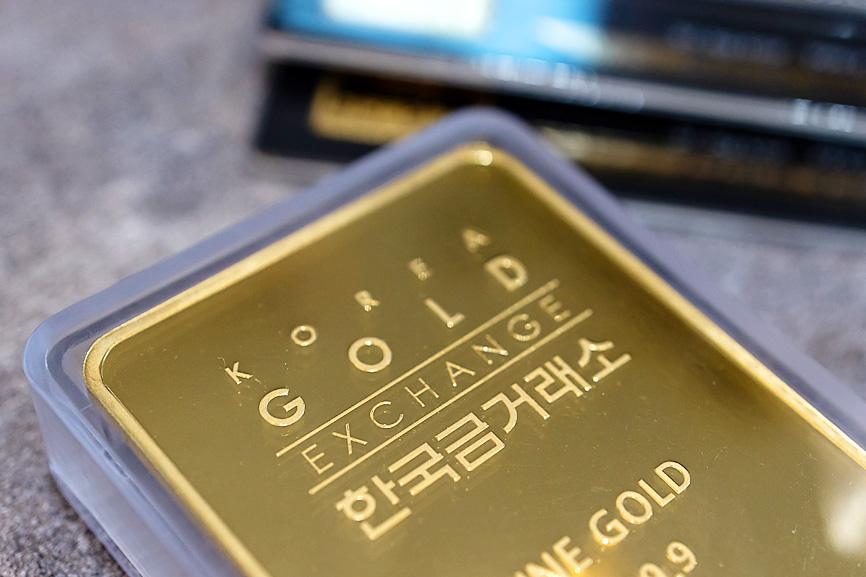Gold posted its biggest weekly gain since July 2020 as the war in Ukraine fueled demand for haven assets.
Investors are assessing the economic fallout from Russia’s invasion of its neighbor, which is disrupting flows of energy, grains and metals.
The resulting surge in oil prices has stoked concerns about global growth and inflation risks.

Photo: Bloomberg
Investors have sought out bullion amid the uncertainty, with holdings in exchange-traded funds backed by the metal climbing to the highest since March last year and hedge fund managers boosting their net bullish gold bets to a 19-month high.
Gold prices extended gains on Friday after a US payrolls report showed that wage growth slowed even as hiring boomed last month. The figures might offer some respite from strong inflationary pressures as the US Federal Reserve gets set to raise interest rates.
The metal “is in a sweet spot for the time being as traders certainly want to have exposure to gold given the war situation in Ukraine,” Ava Trade chief market analyst Naeem Aslam said. Still, the jobs data “has confirmed that the Fed has the green light to increase the interest rate and this is likely to keep the gold price on a tight leash.”
Spot gold on Friday rose 1.7 percent to US$1,972.06 an ounce in New York for an about 4.2 percent weekly gain, the biggest since July 2020.
Bullion for April delivery increased 1.6 percent to settle at US$1,966.60 on the Comex.
Spot palladium advanced 8 percent, topping US$3,000 for the first time since May last year on concerns over potential supply disruptions. The metal is up 27 percent this week. Russia produces about 40 percent of the metal mined globally.
Silver and platinum also surged.
Commodity prices soared the most on record this week as Russia’s invasion of Ukraine threatens key supplies of energy, crops and metals that were already tight as major economies emerged from the COVID-19 pandemic.
The Bloomberg Commodity Spot Index, which tracks 23 futures contracts, climbed 13 percent in the week that ended on Friday. That is the most in data going back to 1960.
Russia’s growing isolation has left traders rushing to secure alternatives to the country’s raw materials, sparking fears of prolonged shortages and accelerating global inflation.
The sanctions, coupled with shipping disruptions in the Black Sea, have brought trade deals with the country to a virtual standstill. Russia is a major supplier of crude, natural gas, grains, fertilizers and metals such as aluminum.
Russia and Ukraine also supply more than one-quarter of world wheat exports, one-fifth of corn sales and a similar share of barley shipments, plus about 80 percent of sunflower oil cargoes.
Europe depends on Russia for about one-quarter of its crude oil and one-third of its natural gas. Russian aluminum typically accounts for about 10 percent of US imports.

Vincent Wei led fellow Singaporean farmers around an empty Malaysian plot, laying out plans for a greenhouse and rows of leafy vegetables. What he pitched was not just space for crops, but a lifeline for growers struggling to make ends meet in a city-state with high prices and little vacant land. The future agriculture hub is part of a joint special economic zone launched last year by the two neighbors, expected to cost US$123 million and produce 10,000 tonnes of fresh produce annually. It is attracting Singaporean farmers with promises of cheaper land, labor and energy just over the border.

US actor Matthew McConaughey has filed recordings of his image and voice with US patent authorities to protect them from unauthorized usage by artificial intelligence (AI) platforms, a representative said earlier this week. Several video clips and audio recordings were registered by the commercial arm of the Just Keep Livin’ Foundation, a non-profit created by the Oscar-winning actor and his wife, Camila, according to the US Patent and Trademark Office database. Many artists are increasingly concerned about the uncontrolled use of their image via generative AI since the rollout of ChatGPT and other AI-powered tools. Several US states have adopted

A proposed billionaires’ tax in California has ignited a political uproar in Silicon Valley, with tech titans threatening to leave the state while California Governor Gavin Newsom of the Democratic Party maneuvers to defeat a levy that he fears would lead to an exodus of wealth. A technology mecca, California has more billionaires than any other US state — a few hundred, by some estimates. About half its personal income tax revenue, a financial backbone in the nearly US$350 billion budget, comes from the top 1 percent of earners. A large healthcare union is attempting to place a proposal before

KEEPING UP: The acquisition of a cleanroom in Taiwan would enable Micron to increase production in a market where demand continues to outpace supply, a Micron official said Micron Technology Inc has signed a letter of intent to buy a fabrication site in Taiwan from Powerchip Semiconductor Manufacturing Corp (力積電) for US$1.8 billion to expand its production of memory chips. Micron would take control of the P5 site in Miaoli County’s Tongluo Township (銅鑼) and plans to ramp up DRAM production in phases after the transaction closes in the second quarter, the company said in a statement on Saturday. The acquisition includes an existing 12 inch fab cleanroom of 27,871m2 and would further position Micron to address growing global demand for memory solutions, the company said. Micron expects the transaction to